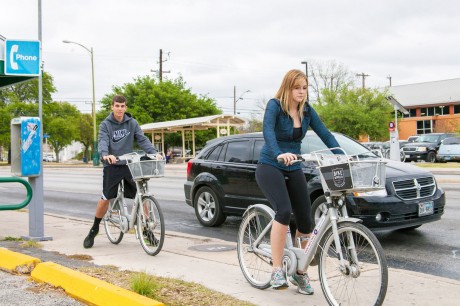
The Student Government Association has been in contact with San Antonio B-Cycle since late 2012 regarding the possibility of installing a B-Cycle station on campus for students to use with the other stations around San Antonio. This summer, the SGA went through further deliberation regarding funding for the station, and a meeting was held on campus to decide where the station might be placed in the future.
“[The students] have the right to know about the process,” said Christian Nardini, Student Government Association senator.
B-Cycle is a bike sharing service that has stations in cities across the country and it allows members to rent out a bike from any station to ride on short trips through the city. The B-Cycle station was originally presented to the Student Government Association in late 2012 by Gus Sullivan, a representative from B-Cycle, and again following the election of new SGA senators in 2013. The possibility of two stations on campus was discussed, but eventually it was decided that one station would be enough. Due to concerns about liability and student interest, the vote on funding was set aside for a later date. A student survey sent out by the SGA regarding whether or not students were interested in having a station on campus yielded the result that student interest was present, though the question of funding still remained.
Over the summer, a request to vote on funding was brought forward by SGA President Evan Lewis, asking that senators make the decision on B-Cycle through an online vote.
Following private discussion between senators and a meeting of the Oversight and Rules Committee, a statement was issued on June 21 that said, “the Oversight and Rules Committee believes rules, procedures and precedent were violated and as of now, $0 shall be issued to B-Cycle at this time,” citing concerns that several rules had been broken with the presentation of the vote.
The Rules Committee noted that not all members within the committee were against the funding of B-Cycle, but that they had concerns towards the manner in which a vote was proposed, and expressed an interest in having “the issue discussed together as an entire legislative body when all [members of the SGA] return in the Fall Semester.”
Lewis responded to the statement through a memorandum to the officers and senators of SGA; David Tuttle, associate vice president for student affairs and dean of students; and Jamie Thompson, director of Campus & Community Involvement. This statement defended the online vote as necessary given the nature of the terms senators serve through the summer.
“To me, it is ridiculous not to expect that [the SGA] would conduct business over the summer,” said Evan Lewis, President of the Student Government Association. “The university changes a lot over the summer, and the SGA should be able to respond to those changes.”
It gave other reasons for that decision, including a deadline for federal grants that would subsidize the cost of B-Cycle, halving the amount that SGA would have to pay. The statement also said that it was “outside of the jurisdiction of the committee to order” that funding would not be given to the project, and that Lewis would proceed using a portion of the SGA reserve fund to finance the B-Cycle proposal.
“I [stayed] out of the issue until people were needing or asking for assistance,” Tuttle said. “The students worked it out and came to good conclusions.”
Following the statement by Lewis regarding continuing forward with the funding, Tuttle stepped forward and requested that a decision on the issue be held until the fall semester. A meeting of Tuttle, Lewis, Sullivan, Nardini, assistant director of facilities services Mike Schweitzer and senator Courtney Iverson was held on campus in order to better decide where the station would be placed. It was decided that, should funding be approved for B-Cycle, the station would most likely be placed in the roundabout near McLean hall. Further discussion regarding funding of the B-Cycle station will proceed during SGA meetings this semester.
“I thought the students handled it assertively and respectfully,” Tuttle said. “It was appropriately resolved.”






